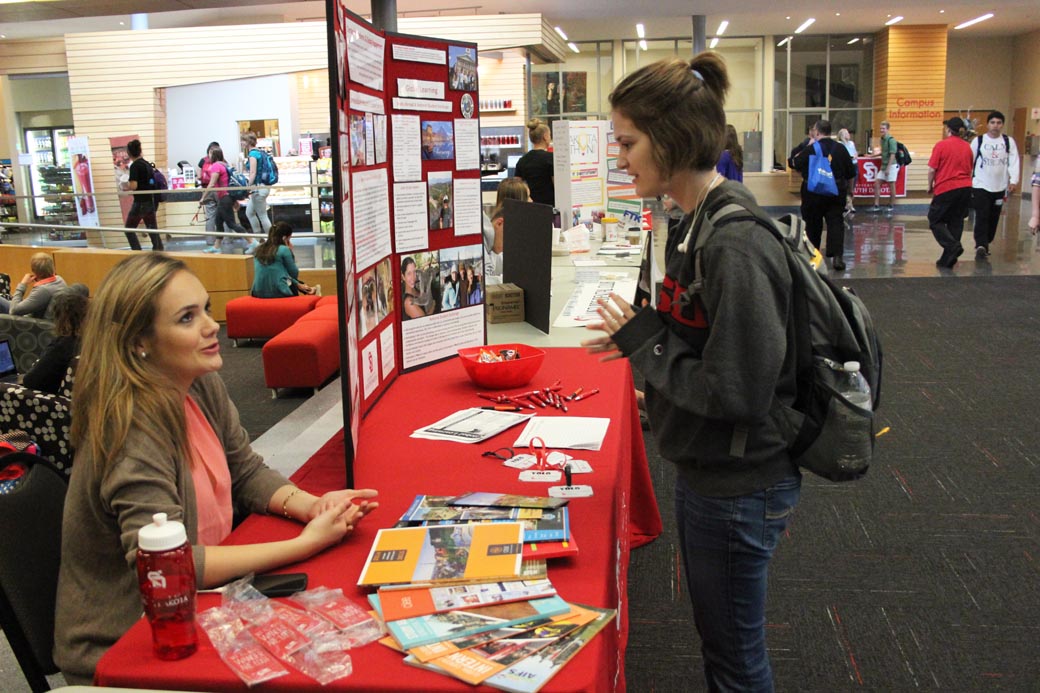
CAGE program offers travel, study abroad opportunities to students
Traveling the world and advocating for political change may seem like far-fetched dreams for some college students, but senior Breanna Helland is taking advantage of one resource at the University of South Dakota to do both of those things.
Helland studied abroad in Madrid, Spain the summer after her sophomore year through the Center for Academic Engagement (CAGE).
Back in the U.S., she is conducting undergraduate research on human trafficking for her honors thesis project with assistance from the center.
“You learn a lot about yourself and what you’re capable of through research,” Helland said.
Services available through CAGE include undergraduate research and creative scholarship and service-learning and community-based programming, director Sarah Hirsch Wittmuss said.
Global learning through study abroad and National Student Exchange and nationally competitive scholarship mentoring are included in CAGE, along with support for international students — a program that was added in January.
More than 1,000 students were involved with CAGE in one way or another, including the annual IdeaFest.
For senior Sam Jolley, checking out the CAGE programs of Alternative Week of Off-Campus Learning (AWOL) and study abroad gave him once-in-a-lifetime experiences.
Jolley said studying abroad in Salamanca, Spain changed his life and trips with AWOL allowed him to experience life in different states.
A trip to Dallas, Texas to help children affected by HIV/AIDS appealed to him as he is pursuing a career in the health field.
“It really sparked my interest because I want to go into pediatrics,” Jolley said.
Wittmuss said students decide to explore what CAGE has to offer when they realize how marketable they could be once they graduate.
“Employers want students who are worldly wise, who can work collaboratively and who have a tolerance for not only diversity — but for ambiguity,” Wittmuss said. “They understand that everything isn’t right or wrong but there are differences in how to consider things.”
Some added benefits of getting involved with CAGE, Wittmuss said, include gaining new experiences, doing better in school and staying at USD all four years.
Becoming more marketable in an increasingly competitive world is essential for college students. That’s where CAGE comes in.
“All of those types of experiences help students increase their confidence because they’re doing something that’s a little bit out of the norm,” Wittmuss said.
Wittmuss said future employers and graduate schools look for certain skills. Those skills can be gained through participating in CAGE activities which can help students grow and allow them to experience different cultures.
“It’s an incredible resource,” Helland said. “It advances our own academic goals, but also can help you realize career goals.”
Jolley said trying one of the CAGE programs offers the opportunity to expand students’ horizons and travel to different countries.
“It really opens your eyes to the big picture, which is the entire world,” Jolley said.
Taking the chance to apply for AWOL, study abroad or participate in research is worth the risk for students, such as Jolley and Helland.
“There is so much more to be discovered and to be learned and experienced,” Helland said.
(Lucia Carlson, a representative for the Center for Academic and Global Engagement, speaks to senior Magan McCann about the benefits of studying abroad Sept. 9 in the Muenster University Center. Malachi Petersen | The Volante)
Students can get more information about the various CAGE programs by going to the center in the Academic Commons located on the first floor of the library.
There is also a Facebook page students can find—”Center for Academic & Global Engagement“— that students can like to stay updated with what is happening in the center.
Applications for the Winter Break AWOL trips are also currently available online and are due by September 19th.
Two-hundred and twenty five students in 2013-2014 school year studied abroad, and CAGE is hoping to double that

